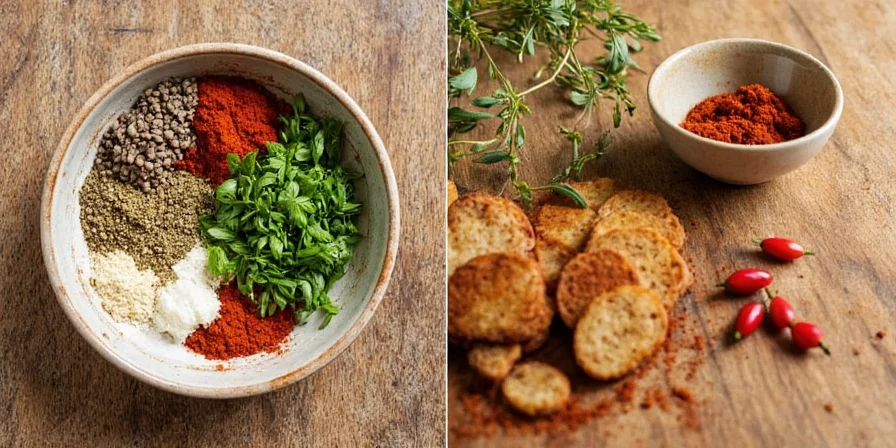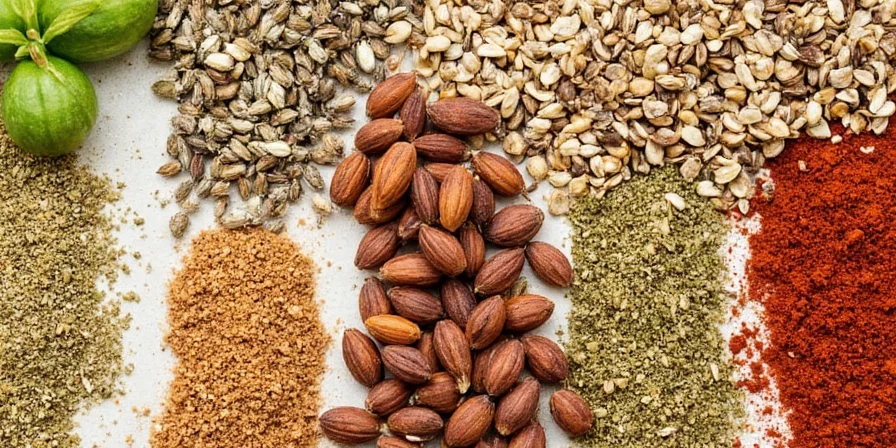7 Greek Herbs & Spices That Will Transform Your Kitchen into a Mediterranean Paradise
Greece is known for its stunning beaches, ancient mythology, and of course — mouthwatering cuisine. While olive oil and feta cheese often steal the spotlight, the real magic behind Greek dishes lies in their legendary herbs and spices. These natural flavor bombs have been enhancing meals for centuries, from souvlaki to moussaka.
In this blog post, we’ll dive deep into the world of Greek herbs and spices, giving you practical cooking tips, cultural insights, and a handy cheat sheet to elevate your everyday meals with authentic Mediterranean flair. And yes, there are plenty of visuals along the way!
🌿 Table of Contents
- #1 Oregano – The King of Greek Flavors
- #2 Mint – For Freshness on a Whole New Level
- #3 Dill – A Bright Note in Seafood & Yogurt Dishes
- #4 Basil – More Than Just Pesto
- #5 Bay Leaves – Don’t Underestimate This Quiet Powerhouse
- #6 Sumac – The Zesty Secret Weapon
- #7 Thyme – Earthy Perfection
- Pro Tips: Using Greek Herbs Like a Pro
- Culture Deep Dive: Spice Traditions Across Greece
- Conclusion: Spice Up Your Life the Greek Way
#1 Oregano – The King of Greek Flavors
If there’s one herb that defines Greek cuisine, it’s oregano. Known as “rigani” in Greek, this earthy, slightly bitter herb is the backbone of many iconic dishes like grilled lamb, roasted vegetables, and tomato-based sauces.
Quick Tip:
- Use dried oregano for best flavor intensity in cooked dishes.
- Fresh oregano works well in salads or dressings where heat isn’t involved.
| Variety | Best Use | Flavor Profile |
|---|---|---|
| Greek Mountain Oregano | Pizza, grilled meats | Strong, aromatic |
| Italian Oregano | Pasta sauces, stews | Slightly sweeter |
#2 Mint – For Freshness on a Whole New Level
Mint (or “mentha”) might make you think of mojitos, but in Greece, it’s commonly used to add a refreshing twist to meat dishes, particularly lamb. It also stars in cool summer drinks like frappe and tzatziki sauce.
Why Mint Works So Well in Greek Cuisine:
- Balances rich flavors
- Adds brightness to heavy dishes
- Perfect for both savory and sweet applications
#3 Dill – A Bright Note in Seafood & Yogurt Dishes
Dill (“anathron” in Greek) is a staple in coastal regions where seafood is king. Whether in fish soups, cucumber-yogurt sauces, or pickled veggies, dill brings a bright, grassy note that’s hard to replicate.
Pro Tip:
- Pair dill with lemon and garlic for a classic Greek trio.
- Use fresh dill for best aroma; dried tends to lose potency quickly.
#4 Basil – More Than Just Pesto
Greeks love basil (“vazilikos”) not just in Italian-inspired dishes but also in simple summer salads and eggplant dishes. Its peppery yet sweet flavor adds depth without overpowering other ingredients.
How to Use Basil in Greek Cooking:
- Add at the end of cooking to preserve flavor
- Great with tomatoes, mozzarella (yes, Greek-style), and olive oil
- Use in homemade limoncello-like infusions
#5 Bay Leaves – Don’t Underestimate This Quiet Powerhouse
You might not see them front and center, but bay leaves are quietly working their magic in slow-cooked stews, rice dishes, and legume-based meals. Their subtle bitterness balances out sweetness and richness beautifully.
Little-Known Fact:
In Greek households, bay leaves are sometimes placed in rice containers to keep pests away — talk about multitasking!
#6 Sumac – The Zesty Secret Weapon
Sumac may not be native to Greece, but it's become a beloved pantry staple across the Aegean. With its tangy, lemon-like flavor, it’s perfect for seasoning grilled meats, sprinkling over hummus, or boosting grain bowls.
Why You Need Sumac:
- Adds acidity without using citrus
- Enhances color and texture visually
- Used in blends like za’atar and custom rubs
#7 Thyme – Earthy Perfection

Thyme (“thymari”) brings an earthy warmth to rustic Greek dishes. Often paired with lemon and olive oil, it’s a must-have for roasting potatoes, chicken, or drizzling over bread dips.
Chef’s Trick:
Try making a thyme-infused honey to glaze roasted vegetables — sweet, savory, and oh-so-Greek.
Pro Tips: Using Greek Herbs Like a Pro
Want to cook like a Greek grandma? Here are some pro-level tricks:
- Dried vs Fresh: Use dried herbs for long-cooking dishes, fresh for finishing touches.
- Storage Secrets: Keep dried herbs in airtight containers away from light. Freeze fresh herbs in olive oil cubes for easy use later.
- Bold is Beautiful: Greek food loves bold flavors — don’t be shy with the herbs!
- Toasted Spices: Lightly toast cumin or coriander seeds before grinding to boost aroma.
- Infused Oils: Make your own flavored oils by steeping herbs in warm olive oil for a few days.
Culture Deep Dive: Spice Traditions Across Greece
Greece is more than just Athens and islands — it’s a tapestry of regional traditions, each with its own spin on herbs and spices.
Aegean Islands
- Heavy use of oregano, dill, and thyme
- Seafood-centric, so fresh herbs shine
Crete
- Wild herbs dominate — like fennel, sage, and mountain tea
- Spice blends often include wild greens and sun-dried tomatoes
Central Greece
- More meat-focused dishes with bay leaf and black pepper
- Use of preserved herbs and pickles
Fun Fact:
In rural areas, families still forage for wild herbs like “vrasto” (wild chamomile) and “chondros” (a type of wild thyme). Talk about farm-to-table!
Conclusion: Spice Up Your Life the Greek Way
Greek herbs and spices aren’t just about flavor — they’re a lifestyle. From the aromatic oregano-laced souvlaki to the zesty kick of sumac, these natural powerhouses bring authenticity, health benefits, and joy to every meal.
So, the next time you reach for salt, why not go Greek? Stock up on these seven must-haves and let your kitchen sing with the spirit of the Mediterranean.
Opa!

Final Checklist: Your Greek Herb & Spice Starter Kit
- Oregano
- Mint
- Dill
- Thyme
- Bay Leaves
- Sumac
- Basil











 浙公网安备
33010002000092号
浙公网安备
33010002000092号 浙B2-20120091-4
浙B2-20120091-4